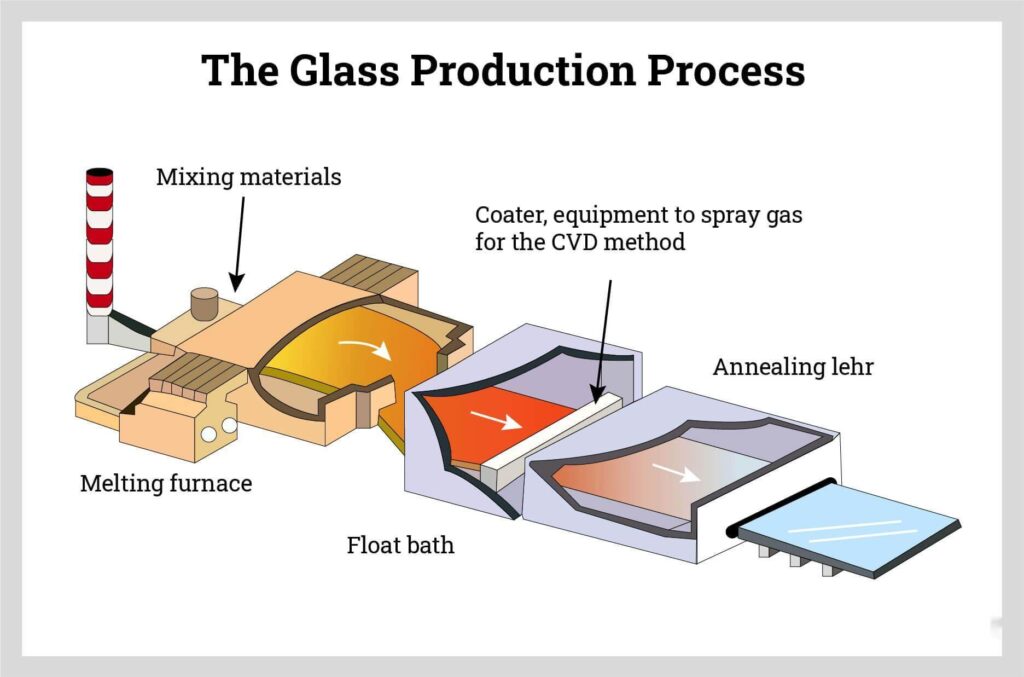Introduction of Glass Manufacturing
The glass manufacturing industry is at the forefront of technological innovation, integrating advanced processes and sustainable practices to meet the growing demand for high-quality and eco-friendly products. This article explores the latest advancements in glass manufacturing technology, focusing on automation, energy-efficient processes, and the introduction of new materials that are reshaping the industry.

The Rise of Automation in Glass Manufacturing
Automation is revolutionizing the glass manufacturing industry, much like it has transformed other sectors. The introduction of automated systems, such as robotic arms and computerized control systems, is streamlining production processes, reducing human error, and boosting productivity. Tasks like cutting, shaping, and polishing glass are now more precise and consistent, resulting in higher quality products and reduced labor costs.
Embracing Energy-Efficient Processes
With the global focus on sustainability and the reduction of carbon emissions, energy efficiency has become a critical priority for glass manufacturers. Innovations such as furnace technology that recycles waste heat are significantly lowering energy consumption during the melting process. Moreover, advanced insulation materials and energy-efficient lighting systems within manufacturing facilities further contribute to reducing overall energy usage, making glass production more sustainable.
The Role of Recycled Materials in Sustainable Manufacturing
The shift towards sustainability is also evident in the raw materials used in glass production. Many manufacturers are increasingly using recycled glass as an eco-friendly alternative to traditional resources. Recycled glass can be melted and reformed into new products, conserving natural resources and reducing the energy costs associated with virgin materials. This approach not only lessens the environmental impact but also aids in waste management by minimizing the amount of glass waste ending up in landfills.
Exploring New Materials in Glass Manufacturing
Innovative materials are opening up new possibilities in the glass industry. Advances in glass science have led to the development of smart glasses that can change color or transparency in response to external stimuli, as well as glasses with enhanced strength and durability. These new materials have applications in various industries, including architecture, automotive, consumer electronics, and healthcare, expanding the potential uses for glass products.
Conclusion: Shaping the Future of Glass Manufacturing
The glass manufacturing industry is undergoing significant transformation, driven by advancements in automation, energy efficiency, and the development of novel materials. These innovations are not only enhancing the efficiency and quality of glass production but are also contributing to a more sustainable and environmentally responsible industry. As demand for high-quality, energy-efficient, and eco-friendly glass products continues to rise, these advancements will play a crucial role in shaping the future of the industry. The ongoing commitment to innovation and sustainability is set to benefit businesses, the environment, and the communities they serve.
Glass Manufacturing Technology FAQ
1.What are the latest advancements in glass manufacturing technology?
The latest advancements in glass manufacturing include automation, energy-efficient processes, and the development of new materials. These innovations are improving production efficiency, product quality, and environmental sustainability.
2.How is automation being used in glass manufacturing?
Automation in glass manufacturing involves the use of robotic arms and computerized control systems. These technologies help streamline production processes, reduce human error, increase precision, and lower labor costs.
3.Why is energy efficiency important in glass manufacturing?
Energy efficiency is crucial due to the need to reduce carbon emissions and environmental impact. By implementing energy-efficient processes like furnace technology that recycles waste heat, glass manufacturers can significantly lower energy consumption during production.
4.What role do recycled materials play in glass manufacturing?
Recycled glass is increasingly used as a sustainable alternative to virgin materials. Using recycled glass conserves natural resources, reduces energy costs, and minimizes waste, contributing to more eco-friendly manufacturing practices.
5.What new materials are being developed in the glass industry?
The glass industry is developing innovative materials such as smart glasses that can change color or transparency and glasses with enhanced strength and durability. These new materials have applications across various industries, including architecture, automotive, and consumer electronics.
6.How are these advancements benefiting the glass manufacturing industry?
These advancements are enhancing the efficiency and quality of glass production, promoting sustainability, and expanding the potential uses for glass products. This not only benefits the industry but also contributes to environmental conservation and community well-being.
